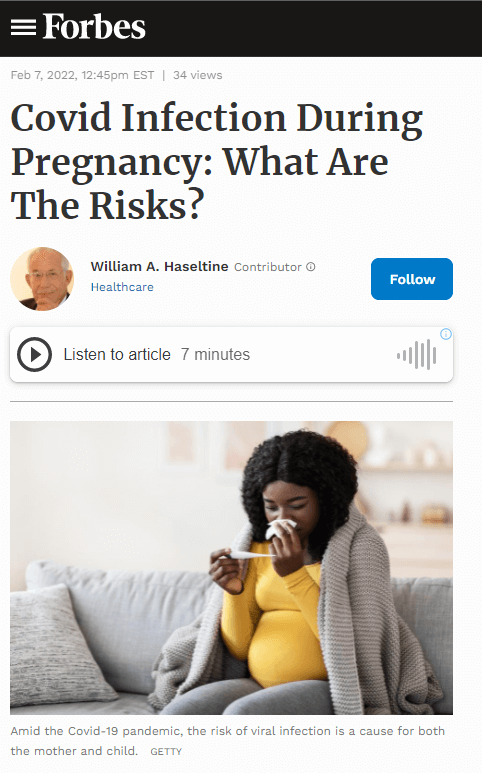Amid the Covid-19 pandemic, the risk of viral infection is a cause for both the mother and child. Although pregnant women are not more likely to contract the virus, infected mothers have an increased risk of severe disease and premature delivery. Key questions are: What are the risks of Covid-19 for the mother and baby?
Covid-19 Risks to Mothers
The risk of severe Covid-19-related complications is higher among pregnant women, compared to the rest of the population. Pregnant women are more likely to be hospitalized and require respiratory ventilation and critical care. Pregnant women who have Covid-19 also have a greater risk than other expecting mothers of stillbirth and preterm birth, defined as delivering earlier than 37 weeks, as well as an increased risk for developing other pregnancy related complications.
In a study from Scotland, unvaccinated women seem to be particularly at risk of these complications if exposed to the virus. Of 4,950 confirmed Covid-19 cases in pregnant women, 77.4% were not vaccinated at the time of infection while 11.5% and 11.1% were partially or fully vaccinated, respectively. Among unvaccinated mothers, 19.5% were admitted to the hospital, in contrast to 8.3% of partially vaccinated women and 5.1% of those that were fully vaccinated. The only documented fetal or infant deaths were seen in unvaccinated women with positive Covid-19 symptoms. Limited data, however, does not explain how direct or indirect effects of viral infection may contribute to preterm births or deaths. Most pregnant women exposed to Covid-19 experience mild to no symptoms, but more severe pregnancy complications are associated with symptomatic unvaccinated patients. Yalda Ashfar, an obstetrician at the Ronald Reagan UCLA Medical Center, warns, “This should shake us and really be a call to action…Vaccination is the clear action item to improve health for pregnant women and their babies.”
This enhanced risk can be understood by first considering how a woman’s body changes as it grows and prepares to birth a new life. Throughout the pregnancy changes in the body alter the maternal immune system to condition tolerance of the fetus. As the fetus grows, the mother’s body enters different stages of immunity. The first trimester is characterized as pro-inflammatory. This phase is important for implanting the embryo and forming the placenta. In the process of adapting to the presence of the fetus, the corresponding innate immune response sends different types of immune cells to the maternal-fetal interface, where the placenta contacts the mother’s blood. Changes in estrogen and progesterone hormone levels in the first trimester simultaneously reduce levels of CD4+ and CD8+ T cells, important for targeting and killing foreign pathogens. Moreover the levels of the ACE2 virus receptor in the placenta, high early on, lower in mid-pregnancy, high again in the last trimester facilitate infection.
Emerging data on Covid-19 outcomes suggests that gestational age at the time of infection is one of the greatest predictors for whether the child will be delivered at full term. In a cohort of 18,335 pregnant women who tested positive for Covid-19, researchers found that women infected during the first two trimesters were more likely to deliver pre-term and stillbirth.
Minority and low-income communities with high rates of infection have greater risk factors associated with worse maternal and birth outcomes. Piekos et al. stated that women in their Covid-19 positive cohort were more likely to be Hispanic and a race other than White or Asian.
Anxieties surrounding the risks of pregnancy during this pandemic also pose significant challenges to mental health. Compared to pre-pandemic incidences, rates of depression among pregnant women have jumped up to 37% and up to 57% for anxiety which persists post delivery.
Covid-19 Risk to the Fetus and Infant
Current findings indicate that the fetus is largely protected against the infection. There is no evidence that infected mothers transmit the virus to the fetus in utero, though in very rare cases traces of the virus have been detected in fetal blood. Most infants delivered to infected mothers test negative for Covid-19.
Understanding this protective mechanism requires a deeper look at the maternal-fetal interface, where the placenta meets the uterus. The placenta is a multi-purpose organ for the fetus, acting as the lungs, heart, kidneys and liver. All the nutrients and resources needed to develop life are transferred from the mother across the placenta and through the umbilical cord. An immune microenvironment is created and sustained at the maternal-fetal interface, serving as a barrier against viral infection.
No infection does not mean no consequence for the fetus of the baby. The immune system of the fetus does respond to the mother’s infection. Compared to Covid-19-negative mothers, infected mothers have elevated levels of IL-8, IL-10 and IL-15 cytokines. Researchers hypothesized that some maternal cytokines can pass through the placenta and induce fetal inflammation This neonatal inflammatory response is mostly mild and does not directly threaten the life of the child. Although it is clear that maternal infection does have a measurable impact on the infant, additional research is needed to determine the short-term and long-lasting effects of Covid-19 exposure.
Conclusion
Expecting mothers need to be vigilant about reducing their risk of exposure to the SARS-CoV-2 virus. This includes upgrading to surgical or N95/KN95 masks, avoiding crowded spaces, and maintaining effective sanitation practices. Women planning to be pregnant should be fully vaccinated against Covid-19 with three standard doses of the Moderna or Pfizer vaccines. Limiting the mother’s risk for infection is our best strategy at protecting the health of the child. Although vaccines are highly recommended for expecting mothers, the persistence of breakthrough cases highlights the importance of greater innovation in vaccine development. Pregnant women, and other vulnerable populations, need vaccines that not only reduce the risk of severe disease but also prevent infection from happening in the first place. The health of the future generation depends on it.


